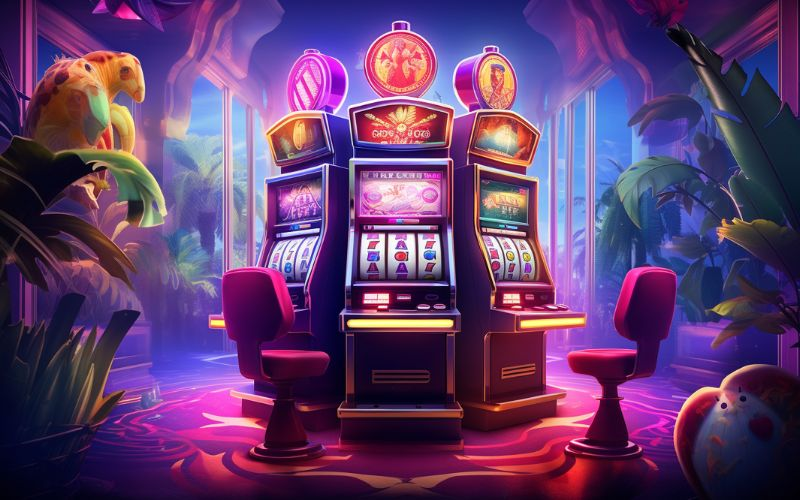






M8win: Sân chơi cá cược trực tuyến hàng đầu châu Á
M8win không chỉ là một nhà cái, mà còn là một thế giới giải trí đa dạng và phong phú, nơi bạn có thể thỏa sức đam mê với các trò chơi casino trực tuyến, cá cược thể thao, esports và nhiều hơn thế nữa. Với giao diện hiện đại, dịch vụ chuyên nghiệp và các chương trình khuyến mãi hấp dẫn, M8win đã trở thành điểm đến lý tưởng cho những ai yêu thích sự hồi hộp và muốn thử vận may.
Hành trình xây dựng thương hiệu
M8win ra đời với mục tiêu mang đến một sân chơi cá cược trực tuyến an toàn, minh bạch và công bằng cho người chơi trên toàn thế giới. Trải qua nhiều năm phát triển, M8win đã không ngừng nỗ lực để hoàn thiện và nâng cao chất lượng dịch vụ, từng bước khẳng định vị thế của mình trên thị trường quốc tế.
Những bước đi đầu tiên
M8win khởi đầu với một số lượng hạn chế các trò chơi casino trực tuyến và các môn thể thao cá cược. Tuy nhiên, nhờ vào sự uy tín và chất lượng, M8win đã nhanh chóng thu hút được sự quan tâm của cộng đồng người chơi.
Sự phát triển vượt bậc
Để đáp ứng nhu cầu ngày càng cao của thị trường, M8win đã mở rộng quy mô hoạt động, bổ sung thêm nhiều trò chơi mới, các môn thể thao cá cược và nâng cấp hệ thống bảo mật. M8win cũng chú trọng đến việc xây dựng đội ngũ nhân viên chuyên nghiệp và nhiệt tình.
Vị thế dẫn đầu
Hiện nay, M8win là một trong những nhà cái hàng đầu tại châu Á, với hàng ngàn người chơi tham gia mỗi ngày. M8win không chỉ là nơi để giải trí và thử vận may, mà còn là nơi để giao lưu, học hỏi và chia sẻ kinh nghiệm với những người cùng đam mê.
Thế giới trò chơi đa dạng tại M8win
M8win cung cấp một loạt các trò chơi và dịch vụ đa dạng, đáp ứng mọi sở thích của người chơi.
Casino trực tuyến
M8win có đầy đủ các trò chơi casino trực tuyến phổ biến như Baccarat, Blackjack, Roulette, Sic Bo và Poker. Các trò chơi này được phát trực tiếp từ các studio chuyên nghiệp, với các dealer xinh đẹp và quyến rũ.
Cá cược thể thao
M8win cung cấp dịch vụ cá cược thể thao với hàng ngàn trận đấu mỗi ngày, từ các giải đấu lớn như Ngoại hạng Anh, La Liga, Champions League đến các giải đấu nhỏ hơn. Bạn có thể đặt cược trước trận đấu hoặc trong trận đấu, với tỷ lệ cược cạnh tranh.
Esports
M8win cũng cung cấp dịch vụ cá cược esports với các trò chơi phổ biến như Liên Minh Huyền Thoại, Dota 2, CS:GO và nhiều hơn thế nữa. Bạn có thể đặt cược vào các đội tuyển yêu thích của mình và theo dõi trực tiếp các trận đấu.
Các trò chơi khác
M8win còn có các trò chơi khác như game slot, bắn cá và lô đề. Các trò chơi này được thiết kế với đồ họa đẹp mắt và luật chơi đơn giản, mang đến những giây phút giải trí thư giãn cho người chơi.
Ưu điểm vượt trội của M8win
M8win có nhiều ưu điểm vượt trội so với các nhà cái khác trên thị trường.
Uy tín và minh bạch
M8win là một nhà cái uy tín và minh bạch, được cấp phép hoạt động hợp pháp bởi các tổ chức quốc tế. M8win cam kết đảm bảo tính công bằng và minh bạch trong mọi kết quả.
Tỷ lệ cược cạnh tranh
M8win có tỷ lệ cược cạnh tranh nhất thị trường, giúp người chơi có cơ hội nhận được những phần thưởng lớn.
Giao diện hiện đại
M8win có giao diện hiện đại và dễ sử dụng, phù hợp với cả người mới bắt đầu và người chơi có kinh nghiệm. Bạn có thể dễ dàng tìm kiếm trò chơi, đặt cược và quản lý tài khoản của mình.
Khuyến mãi hấp dẫn
M8win thường xuyên tổ chức các chương trình khuyến mãi hấp dẫn, mang đến nhiều cơ hội nhận thưởng cho người chơi. Các khuyến mãi có thể là tiền thưởng, quà tặng hoặc các ưu đãi đặc biệt khác.

Hỗ trợ khách hàng tận tâm
M8win có đội ngũ hỗ trợ khách hàng tận tâm và chuyên nghiệp, sẵn sàng giải đáp mọi thắc mắc và hỗ trợ người chơi 24/7. Bạn có thể liên hệ với M8win qua điện thoại, email, chat trực tuyến hoặc các kênh mạng xã hội.
M8win và trách nhiệm với cộng đồng
M8win không chỉ là một nhà cái, mà còn là một thành viên có trách nhiệm với cộng đồng. M8win luôn tuân thủ các quy định của pháp luật và đóng góp vào sự phát triển của xã hội.
Chống gian lận
M8win cam kết chống gian lận và đảm bảo tính công bằng trong mọi kết quả. M8win sử dụng các công nghệ hiện đại để phát hiện và ngăn chặn các hành vi gian lận.
Bảo vệ người chơi
M8win có các biện pháp bảo vệ người chơi khỏi các tác động tiêu cực của cờ bạc. M8win khuyến khích người chơi chơi có trách nhiệm và kiểm soát được thời gian và tiền bạc của mình.
Hỗ trợ cộng đồng
M8win thường xuyên tham gia các hoạt động từ thiện và cộng đồng, giúp đỡ những người có hoàn cảnh khó khăn. M8win cũng đóng góp vào các quỹ từ thiện và các dự án phát triển xã hội.

Kết luận
M8win là một nhà cái uy tín và chất lượng tại châu Á, mang đến những trải nghiệm giải trí tuyệt vời. Với các trò chơi đa dạng, tỷ lệ cược cạnh tranh và các chương trình khuyến mãi hấp dẫn, M8win là điểm đến lý tưởng cho những người yêu thích casino trực tuyến, cá cược thể thao và esports. Đồng thời, M8win cũng là một doanh nghiệp có trách nhiệm với cộng đồng, luôn tuân thủ các quy định của pháp luật và đóng góp vào sự phát triển của xã hội.